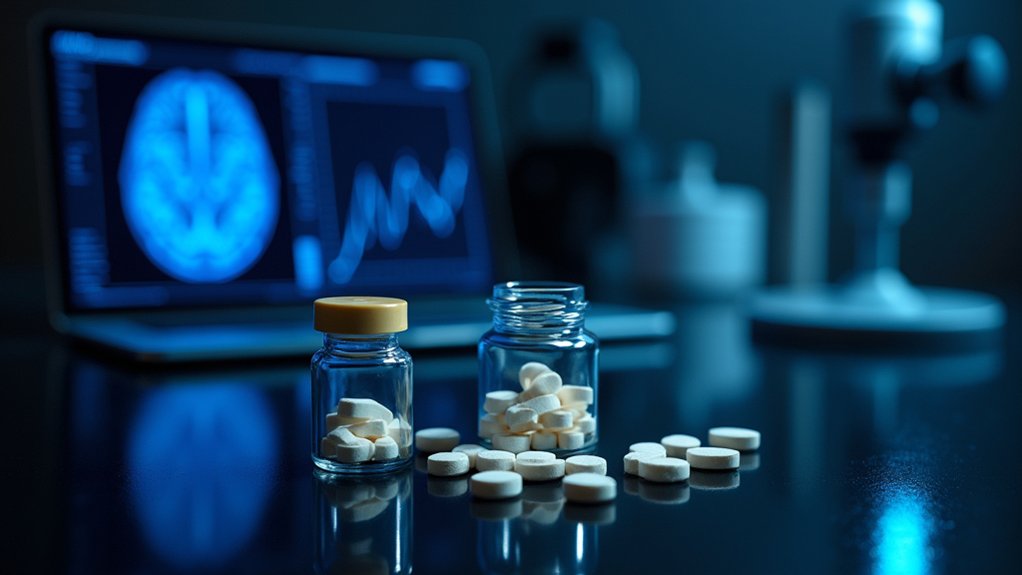Melatonin can considerably influence your depression symptoms through its effects on circadian rhythms and neurotransmitter regulation. As a hormone that controls sleep-wake cycles, it directly impacts your mood regulation and cognitive function. Research shows mixed results, with low doses (0.5-5mg) potentially helping manage symptoms, particularly if you’re experiencing sleep disturbances. While some studies demonstrate meaningful symptom reductions, your response may vary based on individual factors and timing of supplementation. Understanding the complex relationship between melatonin and depression can help optimize your treatment approach. Additionally, optimizing melatonin can support sleep, mood, and overall mental health. Understanding anxiety and depression allows for a more personalized treatment approach, combining supplementation with therapy to improve symptoms and quality of life.
Understanding the Melatonin-Depression Connection

While melatonin is primarily known for regulating sleep-wake cycles, its relationship with depression involves complex neurobiological mechanisms. Your brain’s melatonin-serotonin interaction plays an essential role in mood regulation, with disrupted patterns potentially contributing to depressive symptoms.
Research shows that melatonin’s influence on depression operates through multiple pathways. It helps normalize circadian adjustment mood patterns by synchronizing your internal clock with environmental light-dark cycles. Disruption of central SCN rhythms has been linked to increased anxiety and depressive behaviors. Studies suggest that low doses help most individuals manage symptoms without serious side effects. Studies in depression-model mice demonstrate melatonin’s ability to restore circadian protein expression, including Per2, Bmal1, and Clock genes. One study found that glymphatic function improved significantly with melatonin treatment in depressed mice. Additionally, melatonin affects your glymphatic system function and neuroplasticity, which can impact sleep and depression symptoms. While clinical evidence remains mixed, improvements in sleep quality through melatonin supplementation may indirectly benefit your mood, especially when depression co-occurs with sleep disturbances.
The Science Behind Circadian Rhythms and Mood
Building on the melatonin-depression connection, understanding the precise mechanisms of circadian rhythms reveals how biological timing affects your mood. Your brain’s suprachiasmatic nucleus (SCN) functions as the master circadian clock, orchestrating complex molecular processes through clock genes like Bmal1 and Clock. Research shows that stress-induced disruptions to these molecular mechanisms can contribute to the development of mood disorders. Seasonal affective disorder affects ten percent of people living in temperate regions who experience shorter winter days.
These genes create feedback loops that regulate essential neurotransmitters, including serotonin, dopamine, and noradrenaline, which display daily rhythmic patterns. When your circadian rhythm becomes disrupted, it triggers increased levels of proinflammatory cytokines and alters monoamine levels in your brain. This disruption can manifest through environmental factors like jet lag or night shift work, potentially precipitating mood disorders. Research shows this relationship is bidirectional: mood disorders can both stem from and contribute to circadian disturbances, creating a complex cycle affecting mental health. The release of melatonin and glucocorticoids serves as a primary endocrine signal of these circadian rhythms, directly influencing your body’s daily physiological responses.
Research Findings on Melatonin Supplementation

Although extensive research has examined melatonin’s impact on depression, meta-analyses reveal complex and sometimes contradictory findings. While overall results don’t show significant benefits across all studies, specific protocols using 10mg daily for 12 weeks have demonstrated meaningful reductions in depression symptoms. Recent evidence suggests patients with higher DBST scores may particularly benefit from melatonin supplementation.
You’ll find the strongest evidence in studies focusing on patients with concurrent sleep disturbances, where 3mg nightly doses produced measurable improvements in mood. Research suggests melatonin’s effectiveness varies based on dosage (ranging from 2-25mg), duration (10 days to 3.5 years), and individual conditions. The supplement shows particular promise for preventing depression in specific populations, such as post-surgical patients and those with acute coronary syndrome. Animal studies support these findings, indicating melatonin’s ability to regulate circadian proteins and reverse stress-induced depressive behaviors. A comprehensive analysis of 754 research publications demonstrates the extensive scientific interest in understanding melatonin’s potential role in depression treatment.
Melatonin’s Impact on Brain Chemistry
Understanding melatonin’s role in brain chemistry begins with its synthesis from serotonin in the pineal gland, where it orchestrates complex interactions across multiple neurotransmitter systems. You’ll find that melatonin directly influences dopamine signaling in key brain regions while regulating norepinephrine content and related enzymes in the adrenal medulla. Research shows that abnormal melatonin levels can significantly impact mood disorders and sleep patterns. Common effects like headache and dizziness indicate its influence on neural function. Studies demonstrate that using weighted blankets can enhance natural melatonin production through deep pressure stimulation. Your brain’s neuroplasticity responds to melatonin’s influence through multiple pathways, affecting cellular metabolism, immunity, and homeostasis. This hormone’s antioxidant properties contribute to neuroprotection, while its regulation of monoamine systems directly impacts depressive symptoms through circadian entrainment and neurotransmitter balance.
| Brain Region | Neurotransmitter Impact | Mood Effect |
|---|---|---|
| Pineal Gland | Serotonin Conversion | Circadian Regulation |
| Forebrain | Dopamine Modulation | Emotional Processing |
| Hippocampus | 5HT1A Expression | Memory & Learning |
| Amygdala | Serotonin Amplitude | Anxiety Response |
Sleep Disorders and Depression: The Melatonin Link

When examining the intricate relationship between sleep disorders and depression, melatonin emerges as a crucial mediator through its regulation of circadian rhythms and neurotransmitter systems.
You’ll find that sleep dysfunction, including insomnia and hypersomnia, represents a cardinal symptom of Major Depressive Disorder (MDD). The connection works bidirectionally – sleep disturbances can worsen your depression while depression disrupts your sleep patterns. Nearly 90% of patients with depression experience some form of sleep complaint. Melatonin’s role becomes particularly significant as it synchronizes your circadian rhythms and influences sleep architecture. Research indicates a positive correlation exists between poor sleep hygiene and depressive symptoms.
Research shows that melatonin supplementation can improve sleep quality, potentially reducing depressive symptoms, especially when sleep disturbance is prominent. While it’s not a direct treatment for depression, melatonin moderates the relationship between depression and insomnia through its interaction with serotonin and other monoamine systems.
Clinical Evidence and Treatment Outcomes
Clinical evidence regarding melatonin’s efficacy in treating depression reveals mixed outcomes across multiple randomized controlled trials and systematic reviews. While some studies show significant improvements in depression symptoms, particularly when sleep disturbance is present, others demonstrate no notable benefits. Research on melatonin’s impact on depression highlights its potential to ease symptoms by improving sleep quality, though effects may vary by dosage and population. Further studies are needed to confirm its role in treatment.
You’ll find strong evidence in trials where melatonin reduced depressive symptoms in patients with co-morbid conditions like obesity and post-breast cancer surgery. The MEDACIS multicenter trial currently explores melatonin’s potential prophylactic effects post-acute coronary syndrome. Recent research shows that patients reporting a high DBST index tend to experience more severe insomnia and depressive symptoms. However, systematic reviews highlight substantial heterogeneity in clinical findings, with doses ranging from 0.125-10 mg showing inconsistent results. Studies specifically examining major depression have produced conflicting outcomes, some reporting improved subjective sleep without affecting depression, while others note significant antidepressant effects, especially when combined with other medications.
Potential Side Effects and Safety Concerns
Despite melatonin’s generally favorable safety profile, you’ll need to take into account several potential adverse effects before starting supplementation.
Common side effects include dizziness, nausea, drowsiness, and temporary confusion. You might experience mood changes, including irritability or brief depressive symptoms. Clinical research has shown that melatonin can lead to significant weight loss in patients. Higher doses ranging from 10 to 20 mg have shown the most significant effects on depressive symptoms. More serious concerns can arise if you’re taking certain medications, particularly CNS depressants like diazepam or antidepressants such as fluvoxamine, which may intensify melatonin’s effects.
If you’re managing depression, exercise particular caution. Some users report paradoxical reactions like worsened dysphoria or sleep disruption. While melatonin hasn’t been shown to trigger major depressive disorder in healthy individuals, long-term safety data remains limited. You’ll need medical supervision if you’re combining melatonin with other psychiatric medications, and never discontinue antidepressants abruptly.
Biomarkers and Treatment Monitoring
Your healthcare provider can measure urinary 6-sulfatoxymelatonin (aMT6s) levels to monitor your response to antidepressant treatment combined with melatonin therapy. Clinical assessments using validated tools like the Beck Depression Inventory (BDI) and Major Depression Inventory (MDI) will track your symptom changes every two weeks. While no definitive molecular biomarkers exist for melatonin’s antidepressant effects, your doctor can evaluate treatment success through sleep quality measures and standardized depression rating scales.
Metabolite Testing Methods
Modern metabolite testing methods have revolutionized our understanding of melatonin’s role in depression through precise biomarker identification and treatment monitoring. Clinical laboratories now employ sophisticated techniques to measure melatonin and its metabolites in various biological samples.
Key testing methodologies include:
- Enzyme-linked immunosorbent assay (ELISA) for quantifying melatonin and 6-sulfatoxymelatonin (aMT6s) in bodily fluids, offering reliable baseline measurements
- Liquid chromatography-mass spectrometry (LC-MS/MS) for highly specific detection of melatonin-related indoles, providing detailed molecular analysis
- Salivary melatonin assays for non-invasive monitoring of circadian rhythm patterns and treatment response
These analytical methods enable clinicians to track urinary aMT6s levels, which can indicate antidepressant response within 24 hours of initial treatment. The integration of genomic markers, particularly AANAT and ASMT variants, further enhances diagnostic precision and treatment monitoring capabilities.
Clinical Measurement Applications
Clinical measurement applications for melatonin biomarkers have emerged as essential tools in depression diagnosis and treatment monitoring. You’ll find urinary 6-sulfatoxymelatonin (aMT6s) measurements particularly valuable, as they reflect 90% of pineal gland melatonin secretion. The aMT6s/creatinine ratio standardizes these results by accounting for urine concentration variations.
When monitoring your depression treatment, clinicians can track disrupted melatonin secretion patterns through aMT6s excretion. This biomarker provides insights into circadian dysregulation and helps evaluate antidepressant response within 24 hours of initial dosing. The measurement directly links to neurotransmission efficiency, unlike peripheral monoamine tests. You’ll notice that melatonin’s role extends beyond sleep regulation; it integrates circadian entrainment, metabolism, immunity, and cellular homeostasis, all relevant to depression symptom progression.
Treatment Response Indicators
Building on our understanding of clinical measurements, specific biomarkers now offer valuable insights into treatment responses for depression. Urinary 6-sulfatoxymelatonin (aMT6s) serves as a direct measure of monoaminergic system integrity, showing increased nighttime production in patients who respond to antidepressants.
Key treatment response indicators include:
- Restoration of circadian protein expression (Per2, Cry2, Bmal1) correlates with reduced depressive behaviors
- Recovery of glymphatic function and AQP4 channel polarization demonstrates melatonin’s effectiveness
- Beck Depression Inventory (BDI) scores show statistically significant improvements with 10mg daily melatonin over 12 weeks
You’ll find these markers particularly useful in tracking therapeutic progress, though aMT6s remains the most reliable biological indicator. MT1/MT2 receptor activation provides additional monitoring options through observable changes in mood, cognition, and sleep patterns.
Therapeutic Applications in Mental Health
Research indicates you can optimize melatonin’s therapeutic effects by aligning clinical treatment strategies with your natural sleep-wake patterns and circadian biology. You’ll find the strongest evidence for melatonin supplementation when it’s integrated into a thorough mental health plan that addresses both sleep disturbance and mood symptoms, supported by data showing significant improvements in depression scores (F = (1, 34) = 6.2, p = 0.017). Your treatment outcomes may improve when melatonin administration is timed strategically to enhance sleep architecture while simultaneously targeting mood regulation through its effects on serotonergic pathways.
Clinical Treatment Strategies
While evidence supporting melatonin’s role in depression treatment continues to emerge, therapeutic applications require careful consideration of dosing strategies and patient characteristics. Clinical trials have demonstrated varying degrees of efficacy, with ideal results typically observed in specific patient subgroups.
Key treatment considerations include:
- Dosage ranges from 3-25mg, with studies showing significant symptom reduction at 3mg for patients with comorbid sleep disturbance and obesity.
- Slow-release formulations (5-10mg) may improve sleep quality but don’t consistently reduce depression severity as monotherapy.
- Combination therapy with standard antidepressants shows promise, particularly when paired with buspirone (15mg).
For best outcomes, you’ll want to target treatment toward patients with circadian dysregulation or post-acute medical conditions, as these populations demonstrate more robust responses to melatonin supplementation.
Sleep-Mood Connection Benefits
Understanding the sleep-mood connection reveals melatonin’s vital role in therapeutic mental health applications. You’ll find that melatonin supplementation directly improves your total sleep time while reducing sleep fragmentation, particularly during non-rapid eye movement (NREM) phases essential for mood regulation.
Through enhanced sleep quality, you’re likely to experience reduced fatigue and increased energy levels, common challenges in depressive states. The supplement works by correcting abnormal circadian clock proteins, including Per2, Bmal1, and Clock, which often become disrupted during depression. This realignment of your sleep-wake cycles can greatly impact your emotional well-being.
Research shows that improved sleep structure correlates with decreased depressive behaviors, suggesting that melatonin’s sleep-enhancing properties may indirectly boost your mood through better rest and restored circadian rhythms.
Sleep Quality and Mood Enhancement Strategies
Since poor sleep quality directly impacts mood regulation and depression symptoms, implementing effective sleep strategies becomes essential for mental health management. Research demonstrates that disrupted sleep architecture commonly manifests in depression, affecting both sleep onset and maintenance. Regular sleep patterns serve as a protective factor against depressive episodes while enhancing mood stability.
Key evidence-based strategies to optimize sleep-mood benefits include:
- Timing melatonin supplementation 30-60 minutes before bedtime at doses between 0.5-5mg to improve sleep onset latency
- Maintaining consistent sleep-wake cycles to support circadian synchronization and regulate neurotransmitter function
- Monitoring for potential drug interactions, especially with CNS depressants or antidepressants, while watching for side effects like drowsiness
These interventions can help restore healthy sleep patterns and support mood regulation through improved circadian rhythm alignment.
Frequently Asked Questions
Can Melatonin Interact Negatively With My Current Antidepressant Medication?
Yes, melatonin can interact negatively with your antidepressant medication. You’re at risk for increased sedation and potentially dangerous serotonin syndrome, especially if you’re taking SSRIs or tricyclics. Fluvoxamine and nortriptyline pose particularly high risks. With 345 known drug interactions, melatonin may also reduce your antidepressant’s effectiveness. You’ll need to consult your healthcare provider before combining melatonin with any antidepressant to guarantee your safety.
How Long Should I Take Melatonin Before Expecting Mood Improvements?
You’ll typically need to take melatonin consistently for 8-12 weeks before experiencing significant mood improvements. Research shows the most substantial benefits emerge after 12 weeks of daily treatment, particularly at a 10mg dose. While some patients notice initial changes around 2-8 weeks, meaningful antidepressant effects aren’t typically observed within the first week. Your response may be more pronounced if you have underlying circadian rhythm irregularities or delayed melatonin patterns.
Does Morning or Evening Melatonin Supplementation Work Better for Depression?
While research directly comparing morning vs. evening melatonin timing for depression is limited, evidence suggests evening supplementation may be more appropriate. This aligns with your body’s natural circadian rhythm. However, you’ll want to note that morning bright light exposure has proven more effective for depression symptoms than evening light. If you’re considering melatonin for depression, consult your healthcare provider about ideal timing for your specific case.
Should I Adjust Melatonin Dosage During Different Seasons?
There’s insufficient scientific evidence to support adjusting your melatonin dosage by season. While your body’s natural melatonin sensitivity varies between summer and winter, research hasn’t established seasonal dosing guidelines. You’ll likely get the best results by maintaining a consistent, low dose (around 0.3 mg for adults over 50) year-round. If you’re using melatonin for sleep regulation, focus instead on maintaining proper timing and sleep hygiene across seasons.
Can Stopping Melatonin Suddenly Make Depression Symptoms Worse?
Yes, suddenly stopping melatonin can temporarily worsen depression symptoms, particularly if you’ve been taking it regularly. You might experience withdrawal effects between days 11-17 after discontinuation, including increased irritability, confusion, and mood changes. If you have a history of depression or mental health conditions, you’re more vulnerable to these effects. It’s safer to gradually reduce your dosage under medical supervision rather than stopping abruptly.






